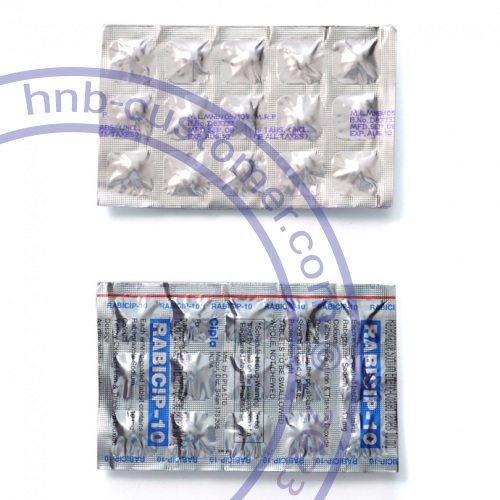

Brand(s):
- Rabicip Rabigal Rabby
Manufacturer:
- Cipla Limited / Galpha Laboratories Limited / Marksans Pharma Ltd.
Disease(s):
- Gastroesophageal Reflux Disease
Known as:
- Aciphex
- We can ship our products to any location worldwide
- Enjoy complete anonymity and robust data security measures
- Exclusive certified products at compelling prices
- Skip the hassle of long queues; get your medicines hassle-free
Aciphex
rabeprazole sodium
| Package | Per tablet | Price | Savings | Order |
|---|---|---|---|---|
|
360 tablets
Free AirMail shipping
|
$ 0.61
|
$ 219.95 $ 0.61 Per tablet
|
$ 379.45
|
|
|
180 tablets
|
$ 0.67
|
$ 119.95 $ 0.67 Per tablet
|
$ 179.75
|
|
|
120 tablets
|
$ 0.75
|
$ 89.95 $ 0.75 Per tablet
|
$ 109.85
|
|
|
90 tablets
|
$ 0.94
|
$ 84.95 $ 0.94 Per tablet
|
$ 64.90
|
|
|
60 tablets
|
$ 1.25
|
$ 74.95 $ 1.25 Per tablet
|
$ 24.95
|
|
|
30 tablets
|
$ 1.67
|
$ 49.95 $ 1.67 Per tablet
|
|
| Package | Per tablet | Price | Savings | Order |
|---|---|---|---|---|
|
360 tablets
Free AirMail shipping
|
$ 0.69
|
$ 249.95 $ 0.69 Per tablet
|
$ 409.93
|
|
|
180 tablets
|
$ 0.83
|
$ 149.95 $ 0.83 Per tablet
|
$ 179.99
|
|
|
120 tablets
|
$ 1.00
|
$ 119.95 $ 1.00 Per tablet
|
$ 100.01
|
|
|
90 tablets
|
$ 1.25
|
$ 112.45 $ 1.25 Per tablet
|
$ 52.52
|
|
|
60 tablets
|
$ 1.50
|
$ 89.95 $ 1.50 Per tablet
|
$ 20.03
|
|
|
30 tablets
|
$ 1.83
|
$ 54.99 $ 1.83 Per tablet
|
|


Brand(s):
- Rabicip Rabigal Rabby
Manufacturer:
- Cipla Limited / Galpha Laboratories Limited / Marksans Pharma Ltd.
Disease(s):
- Gastroesophageal Reflux Disease
Known as:
- Aciphex
Rabeprazole Sodium Tablets
What is Rabeprazole Sodium?
Rabeprazole sodium is a medication that works by reducing the amount of acid your stomach produces. It's a proton pump inhibitor (PPI), meaning it targets the "pumps" in your stomach cells responsible for acid secretion. This makes it effective in treating a variety of conditions related to excess stomach acid.
Specifically, rabeprazole is used to treat:
- Gastroesophageal reflux disease (GERD): This is a common condition where stomach acid flows back into the esophagus, causing heartburn and other symptoms.
- Certain types of ulcers: Both stomach and duodenal ulcers can be treated with rabeprazole.
- Helicobacter pylori (H. pylori) infection: This bacteria is a major cause of stomach ulcers. Rabeprazole is often used in combination with antibiotics to eradicate the infection.
- Esophagitis: Inflammation of the esophagus, often a consequence of GERD.
- Zollinger-Ellison syndrome: A rare condition characterized by the overproduction of stomach acid.
Important Information for Your Doctor
Before starting rabeprazole, be sure to tell your doctor about all your medical conditions, including:
- Liver disease: Rabeprazole is processed by the liver, and liver problems may affect how well it works or increase the risk of side effects.
- Allergies: Inform your doctor if you have any allergies, especially to other PPIs such as esomeprazole, omeprazole, lansoprazole, or to any other medications, foods, dyes, or preservatives.
- Pregnancy or breastfeeding: The use of rabeprazole during pregnancy or breastfeeding requires careful consideration and discussion with your doctor.
How to Take Rabeprazole Sodium
Rabeprazole sodium tablets are taken orally. Swallow the tablets whole with a glass of water. Do not crush, break, or chew them. You can take them with or without food, but it's best to maintain a consistent schedule. Follow your doctor's prescribed dosage and frequency carefully. Do not take more than prescribed.
Children's dosage needs to be determined by a pediatrician. Never give a child medication without consulting a doctor.
Overdose: In case of a suspected overdose, immediately contact a poison control center or emergency room.
Important: This medication is prescribed only for you. Do not share it with others.
Missed Dose
If you miss a dose, take it as soon as you remember. However, if it's almost time for your next dose, skip the missed dose and continue with your regular schedule. Never double the dose.
Potential Drug Interactions
Rabeprazole can interact with several other medications. It is crucial to inform your doctor about all medications you're taking, including:
- Ampicillin
- Atazanavir
- Cyclosporine
- Digoxin
- Iron salts
- Itraconazole, ketoconazole, voriconazole, and other antifungals
- Warfarin
This also includes over-the-counter medications, supplements (herbal or nutritional), and even regular consumption of caffeine, alcohol, or tobacco. These substances can affect how rabeprazole works, and vice-versa. Always consult your doctor before starting or stopping any medication.
Monitoring Your Progress
It might take a few days to notice improvement in your symptoms. If your condition doesn't improve or worsens, contact your doctor immediately.
Possible Side Effects
Serious side effects requiring immediate medical attention include:
- Fever or sore throat
- Persistent skin rash
- Facial, eyelid, lip, tongue, or throat swelling; difficulty swallowing
- Breathing difficulties or chest tightness
- Unusual bleeding or bruising
- Yellowing of the eyes or skin (jaundice)
Less serious side effects that usually don't require medical attention (but inform your doctor if they persist or bother you):
- Diarrhea
- Dizziness
- Headache
- Nausea or vomiting
This is not an exhaustive list of all possible side effects. Consult your doctor or pharmacist for more information.
Storage
Keep this medication out of reach of children. Store at room temperature between 15°C and 30°C (59°F and 86°F). Protect from light and moisture. Discard any unused medication after the expiration date.
```









